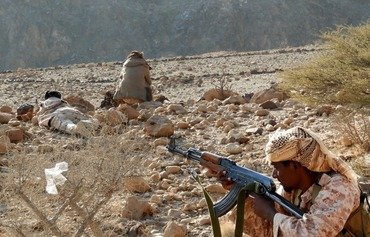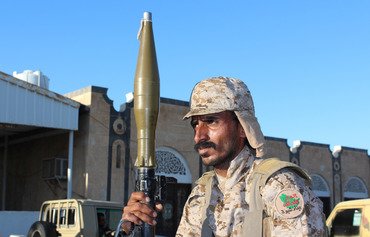Al-Qaeda in the Arabian Peninsula (AQAP) has suffered a series of defeats and setbacks in Yemen's Hadramaut, Abyan and Shabwa provinces, and financial difficulties have forced it to lower its profile, experts and monitors said.
The extremist group is now confined to Yemen, where it is under sustained pressure from military strikes against many of its leaders, according to the report of a UN monitoring team submitted to the Security Council January 15th.
But AQAP remains a threat, sheltering its elements among local communities, targeting Yemeni and Arab coalition forces in Shabwa and Abyan, and instigating clashes with tribal elite forces in Shabwa and Hadramaut, the report said.
According to the UN report, AQAP has been expelled from some of its long-time strongholds in Shabwa's Markhah district and redeployed to al-Bayda province.
But the group "remains aggressive, sustaining a campaign of guerrilla warfare and strategic retreats and conducting bombing operations and assassinations, especially the targeting of government officials", the report said.
Financial difficulties have forced AQAP to lower its profile, the report said, adding that the group has largely restricted itself to indirect clashes with the Arab coalition, mainly in the southern provinces.
Defeats and setbacks
AQAP has been weakened but not debilitated, as the Yemeni state is still weak, Yemeni experts told Al-Mashareq.
This adversely affects efforts to curb AQAP’s activity, they said, even though the group has suffered defeats and setbacks in Hadramaut, Abyan and Shabwa.
After Arab coalition forces established control in these areas, "AQAP slipped out of sight and retreated, as part of its usual strategy of retreating and carrying out occasional attacks", political analyst Adnan al-Humairi told Al-Mashareq.
Abyan, Shabwa and Hadramaut are still afflicted with an al-Qaeda presence, he said, adding that when security forces appear, the group's fighters go into hiding.
AQAP elements have a presence in al-Qayfa area of al-Bayda province "because they still have tribal support in those areas", he said.
In addition to facing pressure from pro-government Yemeni and Arab coalition forces, he noted, the group is "in a state of continuous confrontation" with the "Islamic State of Iraq and Syria" (ISIS) in the Yakla area in al-Qayfa.
"AQAP is weakened, but not debilitated," he said, noting that the war has created a fertile environment for the recruitment of fighters and has contributed to the group's survival.
The group still maintains a presence in many cities "but it is a stealthy presence, especially in Taez and several southern regions", al-Humairi said.
In Shabwa, residents are standing with Security Belt Forces against AQAP because they feel safe in the presence of security forces, al-Humairi said.
Additionally, he said, many tribal leaders have joined the campaign to oust al-Qaeda led by the UAE-backed Elite Forces.
Residents are especially supportive because Elite Forces "are comprised of Shabwa natives and tribesmen who enjoy generous UAE support", he said.
Loss of territory
"The drop in AQAP’s activity in the traditional areas of its influence stems from the difficult conditions experienced by these elements," political analyst Yassin al-Tamimi told Al-Mashareq.
"There are AQAP-affiliated elements who are actively pursuing the group’s objectives, and these elements are facing very difficult circumstances that have curtailed their ability to deploy publicly as they did in the past," he said.
"AQAP lost areas it controlled for a period of time in Hadramaut province's al-Mukalla, and in Abyan and Shabwa provinces," said Nawal Abdel Rahman, a researcher at Sanaa University's Population Studies Centre.
This was "thanks to the military intervention led by Arab coalition countries and their support of local forces", she told Al-Mashareq.
AQAP’s attacks on security forces and military leaders are a reaction to the continued pursuit of its elements and leaders in these provinces, where it has lost most of its financial and social support, she said.
"Yemen’s stability, the return of a strong state and elimination of the political, economic and social factors that aid AQAP's spread will spell the end of the group in Yemen," Abdel Rahman said.

![Yemeni men and security forces inspect the site of a suicide bombing carried out by al-Qaeda in the southern port city of Aden, on November 5th, 2017. [Stringer/AFP]](/cnmi_am/images/2019/03/05/17011-yemen-aqap-600_384.jpg)






